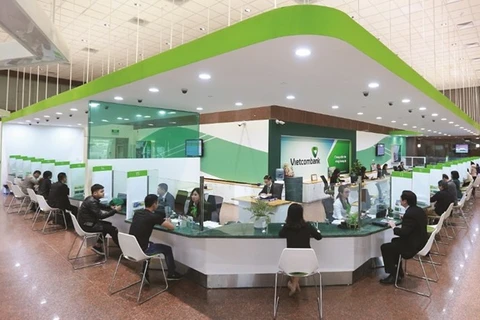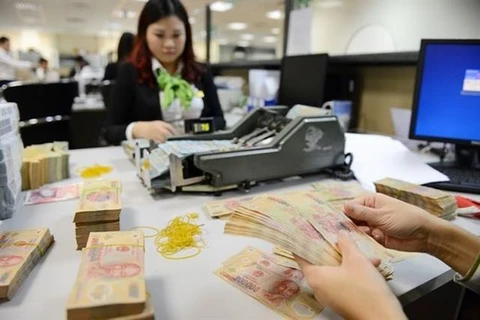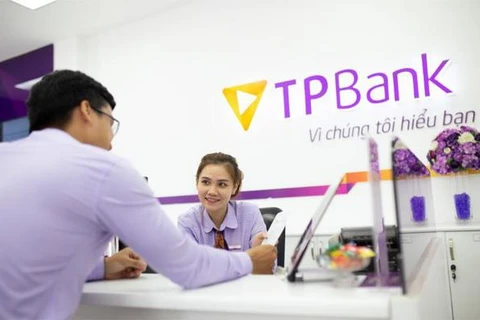 The Vietinbank logo at an office. The bank and three others - BIDV, Vietcombank and Agribank - cannot lift the foreign ownership cap in their capital after the EVFTA takes effect early next year as expected. (Photo vietnamfinance.vn))
The Vietinbank logo at an office. The bank and three others - BIDV, Vietcombank and Agribank - cannot lift the foreign ownership cap in their capital after the EVFTA takes effect early next year as expected. (Photo vietnamfinance.vn)) Hanoi (VNS/VNA) - The Vietnamese Government may allow European financial firms to buy up to 49 percent of only two local commercial banks, Nguyen Thi Thu Trang, Director of the WTO Integration Centre at the Vietnam Chamber of Commerce and Industry, said on October 23.
The offer will be valid for five years after the Europe-Viet Nam Free Trade Agreement (EVFTA) takes effect, which is expected to occur early next year.
The EVFTA was signed between Vietnam and the European Union on June 30, 2019, opening opportunities for firms of both sides to tap the two markets with a total 600 million people.
Trang said that the offer does not apply to four joint-stock commercial banks, in which the State still holds the controlling stakes.
Those are the Joint Stock Commercial Bank for Investment and Development Bank of Vietnam (BIDV), the Vietnam Joint Stock Commercial Bank for Industry and Trade (Vietinbank), the Vietnam Joint Stock Commercial Bank for Foreign Trade of Vietnam (Vietcombank), and the Vietnam Bank for Agriculture and Rural Development (Agribank).
Under existing regulations, the maximum rate of foreign ownership in a commercial bank is set at 30 percent.
It is the “first come, first served” principle, meaning the first two banks signing up will be allowed to lift their foreign ownership cap from 30 percent to 49 percent, Trang said.
After the five-year deadline, the offer expires and any proposals will be rejected, she added.
In the first five years from the effective date of the EVFTA, no new telecommunication segment is opened and no big changes are made with the industry, Trang said.
But after that period, European companies may be allowed to set up joint ventures with local businesses that have not invested in and constructed telecom infrastructure, she said. European investors may own a maximum of 100 percent of the joint ventures.
Vietnam will also allow foreign firms to purchase shares in local firms, set up joint-ventures and establish their representative offices in the country under the EVFTA in other sectors such as insurance and securities, the VCCI official said.
According to Trang, the EVFTA will help improve the business environment in Vietnam, especially making the financial sector more transparent.
“The financial and telecommunication industries are quite sensitive. Vietnam commits to opening opportunities for foreign firms to raise the sector’s competitiveness and development, thus boosting the country’s socio-economic development,” Trang said.
She urged local firms to renovate their technologies and business models as there will be very strong players coming from Europe.
Vietnamese companies need to prepare because European companies will flock to the domestic market in about five years, Nguyen Quy Quyen, an official at the international cooperation department of the Ministry of Information and Communications, said.
European companies, especially telecommunication firms, have very strong financial fundamentals, so they may dominate the domestic market, he said, adding there will be both opportunities and challenges for Vietnamese businesses.
But the five-year period from 2020 to 2025 will be a good time for Vietnamese firms to prepare, get stronger in every aspect, and study the ways European firms operate so that they become more competitive, said Vu The Binh, Vice Chairman and General Secretary of the Vietnam Internet Association./.
VNA























